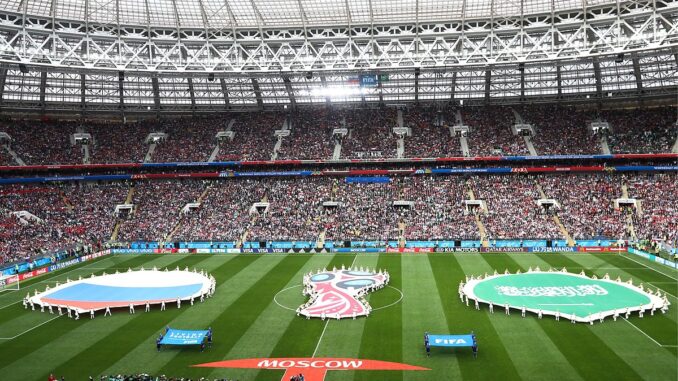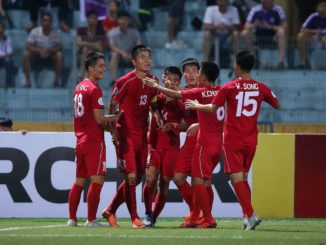
As the world revels in the aftermath of Lionel Messi’s career pinnacle, the pace of change in international football propels us forward towards a new year, and a new cycle on the road to World Cup 2026.
Yet, while much of the globe has focused their attention on Qatar over the last month, the looming story of Russia’s continued suspension from international football remains one that’ll continue to provide column inches long into 2023.
As we approach the turn of the calendar year however, could we be about to see the former Soviet power move one step closer to a potential move to Asian football?
20 November may have stood out to many as the World Cup opener between Qatar and Ecuador, yet only hours earlier the inescapable elephant in FIFA’s rear-view mirror – Russia – continued to stir away from the media gaze with a friendly match in neighbouring Uzbekistan.
Russia have been left out in the footballing wilderness since February, following the country’s invasion of Ukraine being met with unified western opposition. FIFA took the unprecedented step of suspending the nation’s football federation indefinitely, curtailing their hopes of World Cup qualification via the UEFA playoffs in March.
Ever since, they’ve wandered the international footballing scene as a pariah state, shirked by much of the world, afraid of the consequences of even acknowledging the football of a national aggressor. However, in recent months, Russia have sought solace in Asia, a political ally turned footballing bailout.
Russia continues to benefit from strong or at the very least sympathetic bonds with large parts of Asia. Politically, Russia and China remain two significant global powers in lockstep, while on a footballing level, their former Soviet Union cousins in Central Asia have already provided international match practice, with friendlies against Iran and India being reportedly lined up for the new year.
Inevitably then, the prospect that Russia’s footballing future may lie in Asia, has started to gain traction with every given month of isolation within Europe.
It’s fast becoming the daily subject of discussion within the Russian media: “should Russia join the AFC?”, posed to any pundit or former player in front of a microphone, with little to distract an audience growingly envious of the World Cup thrust before them incessantly over the last month.
Opinion is duly split at home as to whether joining the AFC is the best way forward, however. Views ocellate between those that consider Asia a significant drop down from Europe in playing quality, to those who share the view of national coach Valery Karpin, who desperately seek competitive play over the medium term; irrespective of the level of competition.
While Asia’s monumental showing at the World Cup has undoubtedly changed some views back in Russia, lacklustre friendly matches over the last few months haven’t exactly got regular punters’ pulses racing at the thought of joining Asian football.
A narrow victory against Kyrgyzstan, alongside goalless draws with Uzbekistan and Tajikistan, may have illustrated a closing field between Europe and Asia, but many have put this solely down to a national team merely drowning in inaction.
That inaction is starting to change the mood around Russian football though. In an interview ahead of the World Cup, Russian Football Union (RFU) president Alexander Dyukov admitted that what once was seen as barely an option, is now very much seen to be a viable solution on the table given to escape this bleak limbo state.
“A few months ago, I said that Asia is untimely and premature. But for now, this is a possibility that we must consider. The RFU will discuss the transition to the Asian Confederation at the next meeting of the executive committee.”
That meeting is due to take place later this week, with the proposal set to lay out the various advantages and drawbacks of moving confederations at this point.
One voice that remains strongly against joining the AFC is that of the Russian Premier League (RPL), who continue to push their preference of staying in Europe, not only to remain financially viable, if or when they return to the UEFA Champions League, but also to retain their position in the European transfer market.
Prize money, despite the AFC’s promised Champions League reforms, would still significantly trail the scale available across all tiers of European continental football.
While we’ve already seen the impact of their suspension on playing stocks, with an exodus of European standard players from Russia since the summer; some of whom were banking on the RPL as a gateway into one of Europe’s top five leagues, supplemented by a different type of player market hailing from Central Asia and beyond.
Of course, football is only one of many sports to be hit by severing ties with global bodies, a similar fate introduced by the International Olympic Committee (IOC) in late February.
The Olympic arena offers a different stage for Russia to compete in; very much a prestige venture rather than a financial one. Success at the Olympics is seen on a different platform to any other sporting achievement, which arguably makes their IOC ban that much more severe.
And with France 2024 emerging into sight, the IOC appear to be the first organisation willing to put their head above the parapet in approaching the Russian problem.
In the last month, the Olympic Council of Asia (OCA) has stepped forward as Russia’s potential saviour, proposing to allow entry to their membership in which to facilitate safe qualification to select sporting events held at the Olympics in two years’ time.
The move has been welcomed by their European and International equivalents, despite grave concerns from some individual sports about Russia’s involvement in France while the Ukraine conflict persists, pertinently expressed by World Athletics chief Sebastian Coe.
A positive reception has materialised, however, as a response to resolving the issue of political interference remaining separate to what can still be considered a broadly individual sporting arena. Russia are getting all too used to competing under the generic Russian Olympic Committee moniker anyway, participating as individuals rather than a larger collective following a doping ban.
There are also less mitigations to shoulder in transitioning continents in Olympic sport compared to football; qualifiers hold less weight, with most of the discipline qualification still deriving from international championships, so the perceived reduction in quality competition isn’t likely to be as pronounced.
These discussions, however, while relating to Olympic sport, do tread a path for FIFA to follow. Arguably one of FIFA president Gianni Infantino and his UEFA compatriot Aleksander Cefan’s key priorities for the coming year will be to remedy the Russia suspension cloud; if the AFC swooped in to remedy this mess, few from the west would be disheartened by Russia’s exit.
If the RFU do decide to pursue an exit though, how likely is it, that it will ever materialise?
One thing’s for sure, time is ticking if they wish to secure competitive play for the coming cycle, with World Cup and Asian Cup qualification due to commence next Autumn, with the draw process expected to be complete by early summer.
Any possible move would also be fraught with complications, not merely due to political disagreements amongst member associations but for the potential of a further stretching of Asian football’s geographical land mass.
Australia’s switch from the OFC back in 2006 brought with it very little kick back from any party, but it unquestionably heightened the divide between East & West given the logistical difficulties its since generated.
The decision, assuming FIFA and UEFA’s support is largely favourable, will come down to the AFC Executive Committee – as it was decided in Australia’s move, unless a wider member vote is carried out.
In both cases “pro-Russia” views will likely win out; the makeup of the AFC ExCo remains heavily tilted in their favour and a wider vote would be expectantly voted through, given the sheer numbers of pro-Russia/neutral members in the West and Southeast of Asia.
The possible difficulty here then, is not necessarily the numbers in opposition, but who they are and what they represent, not just in Asia but on a global platform.
Japan, South Korea and Australia represent arguably the three most internationally recognisable member associations in the AFC, and if this recent World Cup is anything to go by; the continent’s current best performers.
Their presence, while diminished in broader membership terms or as part of the ExCo, remains key. The three countries are considered to wield a significant presence within the elite nation taskforce, responsible for a number of recent initiatives ran by the confederation including their Champions League reforms whilst offering a significant counterbalance in ensuring parity for between regions.
Politically speaking, however, the East Asian trio are far removed from their neighbours’ views, three significant voices as part of the Global North that have castigated Russia and provided support to Ukraine, but three voices not reflective of the general consensus within Asia.
Any decision then that looks to support Russia, will be fiercely opposed politically back home, at a time where the AFC need only a spark to suggest an all-out internal conflict between its members.
The AFC’s decision to grant Asian Cup 2023 (soon to be announced for 2024) hosting to Qatar in favour of South Korea, later confirmed as one of three successive continental showpiece held in the Middle East has already burnt bridges between the East and the confederation.
Alongside recent mishandlings of the AFC Champions League, including a calendar shift initiated by the West, further disagreement is only going to add more weight and favour behind a potential split in the confederation.
With World Cup expansion ahead, and the possibility of Russia (even Belarus, 15,000 kilometres and 11 hours northwest of Melbourne) dragging the continent’s reach halfway round the world, there will be a number of voices within the AFC and their members starting to map out contingencies if an exit plan is required.
This week’s meeting of the RFU board remains key to the challenges facing Asian football over the coming years. Fresh off the back of their strongest showing at a World Cup in their history, could Asia’s days, as a footballing continent be numbered?
Listen to The Asian Game Podcast as we preview the 2022 Mitsubishi Electric Cup and speak with Thai coach Mano Polking




